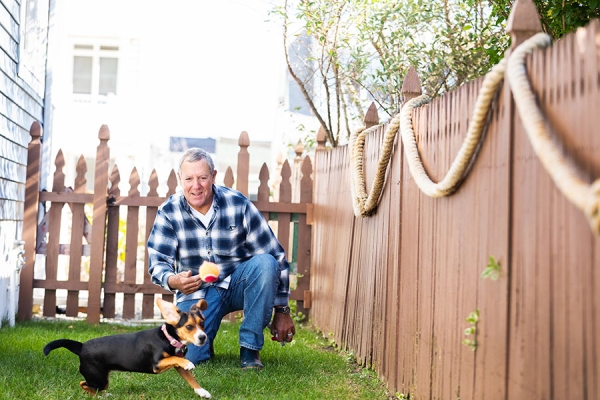Steve lost his father and three other relatives to prostate cancer. For a long time, he worried that he, too, might one day be diagnosed with the disease — the second-most-common cancer in men after skin cancer.
“It’s been on my radar since I was a young man,” Steve says. “It was very much in the background.”
Steve, now 64 and a retired scientist, says those concerns were one reason he began getting screened for prostate cancer with a digital rectal exam and a prostate-specific antigen (PSA) test more than 10 years ago as part of his routine physicals. Screening can help find prostate cancer before there are symptoms and when there may be more treatment options.
Steve’s first PSA result, at age 51, was normal for a man his age. But over time, his PSA level began to climb. In 2018, when it rose from 3 nanograms per milliliter (ng/mL) to 4 ng/mL in just over six months, Steve had his first of several prostate biopsies. That biopsy was negative. But in 2020, Steve’s second biopsy revealed cancer in two areas of the prostate gland.
“That was the first time I said to myself, ‘Oh, I have cancer,’” Steve recalls.
From active surveillance to precision robotic surgery
After discussing his diagnosis with his local urologist, Steve chose to begin active surveillance instead of immediate treatment.
With active surveillance, a person has frequent tests and exams but does not undergo treatment unless the prostate cancer grows or causes symptoms. This can be an option for some men because prostate cancer often grows so slowly that treatment, which can cause serious side effects, might never be needed.
However, in Steve’s case, within about a year, further testing indicated that his prostate cancer was growing quickly and was potentially very serious. His urologist recommended prostatectomy, a surgery to remove the prostate gland.
Steve says he knew he wanted to have the surgery done by a team with a lot of experience in prostate cancer surgery. A relative recommended urologist Daniel D. Eun, MD, chief of robotic surgery at Temple Health. Steve learned that Dr. Eun is a world-renowned urologist who specializes in minimally invasive robotic surgeries, and that he and his team perform many such prostate surgeries a week.
“Dr. Eun was highly recommended,” Steve says. “I looked up his background, which is amazing. And then he spent an hour with us and answered every question we had. At that point, I thought, ‘This is the guy I will go with.’”
In October 2021, Steve had robotic-assisted nerve-sparing prostate surgery at Temple. With this method, the goal is to remove the cancer without harming the nerves that control erection or urinary function. Steve says that speaking to Dr. Eun about his skill with this surgical method was reassuring.
Robotic prostate cancer surgery uses smaller incisions than traditional open surgery. This can result in a shorter hospital stay and a speedier recovery.
“I was home by 5 p.m. that night,” Steve says. “It was pretty amazing.”
Putting prostate cancer in the rearview mirror
Today, tests show that Steve is cancer-free. He’s happy to be moving on with his life, which includes enjoying his family and favorite activities, such as scuba diving, bike riding, hiking, and surfing.
“I think I’m in better shape than I was pre-surgery because I’ve focused a bit more on a fitness program,” Steve says. “I’m walking probably three miles a day. I’ve got two kids and four grandkids. I’m hoping to be around for them a lot.”
What’s more, Steve has not had any urinary or sexual side effects after his prostate cancer surgery.
